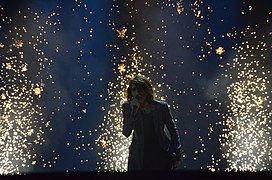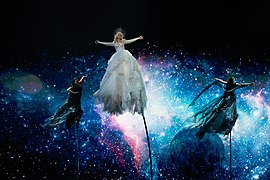Australia at the Eurovision Song Contest
This article looks at the history of Australia as a participant in the Eurovision Song Contest .
Regularity of participation and successes in competition
Australia came into contact with the competition as early as 1983 when the competition was broadcast there for the first time. Since then, the competition has been broadcast regularly in Australia without the country even participating. In 2013 , on the 30th anniversary of the first broadcast of the competition in Australia, the country was mentioned for the first time in a Eurovision broadcast. So a short video of SBS with the title was during the live transmission of the first semi-final Greetings from Australia (dt .: Greetings from Australia ) recorded by the Australian Euro Vision commentator Julia Zemiro explained why Australia follow the ESC with so much interest. In 2014 , Australia was allowed to enter the Eurovision stage for the first time. During the break of the second semi-final, the Australian singer Jessica Mauboy had an out-of-competition appearance as an interval act on the mediation of the Australian television station SBS . In 2015, Australia made its debut as a participant.
Finally, in February 2015 , the EBU announced that Australia would make its debut in the competition. The country received an invitation from the EBU because the competition has been broadcast there since 1983 and is very popular there. Australia qualified directly for the final and were allowed to vote in both semifinals. Initially, it was planned that Australia would have had to win the competition in Vienna in order to participate in 2016. The competition would then have taken place in Europe. After Guy Sebastian only finished 5th in the final, it was initially unclear whether the country would participate again in 2016. In May 2015, Jon Ola Sand , Executive Supervisor of the ESC, said that the ESC Reference Group was debating whether to allow countries outside the EBU to participate, but that the competition would in any case be held in Europe. On November 17, 2015, the EBU finally announced that Australia would be allowed to participate for the second time in a row in 2016. This time it had to qualify for the final in a semi-final. The singer Dami Im took part in the second semi-final and was able to win it. In the final, she brought Australia to second place, also as the winner of the jury voting, which is Australia's best result so far. With a score of 511 points, she also achieved Australia's highest score in the competition to date. After this success, the country also participated in 2017.
In 2017 the singer Isaiah, like his predecessor, reached the final for Australia. With 9th place Australia secured its third place in the top ten in a row, but only two points came from the spectators (from Denmark), the remaining 171 points from the juries. Despite this, Australia also took part in 2018. After an internal selection of the singer Jessica Mauboy , who already appeared as an Interval act in Copenhagen in 2014, she also reached the finals. There Mauboy only finished 20th with 99 points, and her entry received the fewest televoting points. To date, this is the country's worst placement in the competition. Participation was also announced for 2019, before it was announced in February 2019 that Australia would participate in the ESC at least until 2023. With Kate Miller-Heidke, an Australian interpreter also appeared in 2019. She won the first semi-final and came in 9th in the final.
In total, four of the five entries ended up in the left half of the table. Since 2018, after Azerbaijan, Romania and Russia failed to reach the finals, Australia, along with Ukraine, have been the only countries in the competition that have qualified for the finals every time they participate. With a second place and only one placement outside the top ten, Australia is one of the most successful participants in the competition.
List of posts
Color legend: - 1st place. - 2nd place. - 3rd place. - Equal points with last place. - Eliminated in the semifinals / in the qualification / in the Eastern European preliminary decision. - no participation / not qualified. - Cancellation of the Eurovision Song Contest.
| year | Interpreter | Song Music (M) and Text (T) |
language | translation | final | Semi-final / qualification |
National preliminary decision |
||
|---|---|---|---|---|---|---|---|---|---|
| space | Points | space | Points | ||||||
| 2015 | Guy Sebastian |
Tonight Again M / T: Guy Sebastian , David Ryan Harris, Louis Schoorl |
English | Tonight again | 5/27 | 196 |
Direct qualification At the invitation of the EBU |
internal selection | |
| 2016 | Dami Im |
Sound of Silence M / T: DNA (David Musumeci, Anthony Egizii) |
English | Sound of silence | 2 / 26th | 511 | 1/18 | 330 | internal selection |
| 2017 | Isaiah Firebrace |
Don't Come Easy M / T: DNA (David Musumeci, Anthony Egizii), Michael Angelo |
English | It's not easy | 9/26 | 173 | 6/18 | 160 | internal selection |
| 2018 | Jessica Mauboy |
We Got Love M: DNA (David Musumeci, Anthony Egizii); T: DNA (David Musumeci, Anthony Egizii), Jessica Mauboy |
English | We have love | 20/26 | 99 | 4/18 | 212 | internal selection |
| 2019 | Kate Miller-Heidke |
Zero Gravity M: Kate Miller-Heidke , Keir Nuttall, Julian Hamilton; T: Kate Miller-Heidke , Keir Nuttall |
English | No gravity | 9/26 | 284 | 1/17 | 261 | Eurovision 2019: Australia Decides |
|
|
Montaigne |
Don't Break Me M / T: Montaigne , DNA (David Musumeci, Anthony Egizii) |
English | Don't break me |
Cancellation due to the COVID-19 pandemic by the EBU |
Eurovision 2020: Australia Decides | |||
| 2021 | Montaigne | internal selection | |||||||
National preliminary decisions
Up to and including 2018, the broadcaster SBS determined all performers with their respective songs internally. Guy Sebastian's Australian contribution was presented on March 16, 2015. Dami Im was announced as the Australian representative for the ESC 2016 on March 3, 2016, her song was then released a week later, on March 10, 2016. Isaiah was announced as the Australian representative with his song in early March 2017 , Jessica Mauboy on December 11, 2017.
On February 9, 2019, Australia's first public preliminary decision, Eurovision 2019: Australia Decides , took place. Kate Miller-Heidke won this with her song Zero Gravity . On February 8, 2020, Montaigne won the second edition of the preliminary decision, Eurovision 2020: Australia Decides , with their song Don't Break Me .
In early April 2020 it was announced that Montaigne will represent Australia in 2021 after the Eurovision Song Contest 2020 has been canceled .
languages
Australia, along with Azerbaijan and the United Kingdom , is one of the three countries that presented all of its contributions in English .
List of commentators and points speakers
This list of commentators and points speakers begins when television broadcasts begin in Australia.
| year | Commentators | Points speaker |
|---|---|---|
| 1983-2000 | Comment via BBC | No participation |
| 2001 | Mary Coustas (commented in the role of Effie ) |
|
| 2002 | Comment via BBC | |
| 2003-2004 | Of manganese | |
| 2005-2008 | Comment via BBC | |
| 2009-2014 | Julia Zemiro Sam Pang |
|
| 2015-2016 | Julia Zemiro Sam Pang |
Lee Lin Chin |
| 2017 | Myf Warhurst Joel Creasey |
|
| 2018 | Ricardo Gonçalves | |
| 2019 | Electric Fields | |
| 2020 | Competition canceled | |
Scoring
The following countries received the most points from or awarded the most points to Australia (as of 2019):
|
|
|
|
||||||||||||||||||||||||||||||||||||||||||||||||||||||||||||||||||||||||||||||||||||||
Award of the highest rating
Since 2015, Australia has given the highest number of points to six different countries, including three to Sweden. In the semifinals, however, Australia awarded the maximum number of points to eight different countries, two of them Belgium and Sweden.
|
|
||||||||||||||||||||||||||||||||||||||||||||||||||||||||||||||
various
- Australia was the only country that had awarded the highest rating (12 points) in the ESC shows more than twice before 2016, as Australia was allowed to vote in both semi-finals and the final in 2015 . Since 2016, all countries have given the highest rating four times.
- From 2010 to 2014, Australia held its own audience vote every year. The result did not influence the final result, but it did show who the Australian audience would have chosen.
Impressions
Web links
- Dean Vuletic: The Eurovision Song Contest, From Australia to Austria (part 1) . April 30, 2014; accessed on February 12, 2015
Individual evidence
- ↑ Yasmin Jeffery: Eurovision 2019: Why is Australia still in the song contest and what would happen if we won? In: abc.net.au. May 15, 2019, accessed on September 21, 2019 .
- ↑ Jessica Mauboy on eurovision.tv; accessed on February 12, 2015
- ^ Dean Vuletic: The Eurovision Song Contest, From Australia to Austria (part 1) . April 30, 2014; accessed on February 12, 2015
- ↑ eurovision.tv
- ↑ escxtra.com
- ↑ Douze Points: Reference Group decision: Australia will be part of the ESC until 2023. February 13, 2019, accessed on February 13, 2019 (German).
- ↑ eurofire.blog.de ( Memento of the original from February 11, 2015 in the Internet Archive ) Info: The archive link was automatically inserted and not yet checked. Please check the original and archive link according to the instructions and then remove this notice.
- ↑ Douze Points: Australia Decides 2019: Who is your favorite? February 6, 2019, accessed on February 13, 2019 (German).
- ↑ Douze Points: ESC-Barometer: How do you like the Australian contribution "Zero Gravity" by Kate Miller-Heidke? February 9, 2019, accessed on February 13, 2019 (German).







